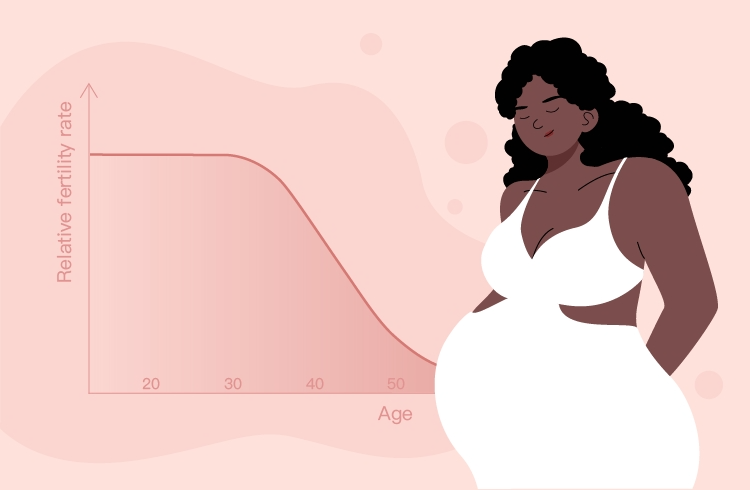Missed or had a late period? Here’s some things to consider and when to act.

A missed period can be a cause for concern when you're not pregnant. There are various factors that can contribute to this. Understanding these possible causes can provide valuable insights and help you decide if further action is needed.
Causes
1. Early Menopause
Early menopause, also known as premature ovarian insufficiency, can lead to missed periods. It occurs when a woman's ovaries stop functioning before the age of 40. Along with missed periods, symptoms may include hot flashes, mood changes, and vaginal dryness.
2. PCOS (Polycystic Ovary Syndrome)
PCOS is a common hormonal disorder that can cause irregular periods or even missed periods. It is characterized by hormonal imbalances and the presence of multiple cysts on the ovaries. Women with PCOS may also experience symptoms such as excessive hair growth, acne, and weight gain.
Suggested product: Myo & D-Chiro 40:1 Inositol
3. Hormonal Problems
Hormonal imbalances, such as an underactive or overactive thyroid gland, can disrupt the normal menstrual cycle and lead to missed periods. Thyroid disorders can affect the production of hormones that regulate the menstrual cycle.
4. Stress
High levels of stress can affect the hypothalamus, a part of the brain that regulates the menstrual cycle. Stress-induced hormonal changes can disrupt ovulation and lead to missed periods.
5. Low Body Weight
Extreme weight loss, low body weight, or excessive exercise can disrupt hormonal balance and cause missed periods. Inadequate calorie intake can impact the production of reproductive hormones necessary for a regular menstrual cycle. Achieving a healthy weight and balanced nutrition can help restore regular periods.
6. Medicines and Medical Treatment
Certain medications, such as hormonal contraceptives, can cause temporary disruption to the menstrual cycle. Additionally, some medical treatments like chemotherapy or radiation therapy can also affect ovarian function and lead to missed periods.
Understanding the potential causes of missed periods can provide insight into your situation. However, it's important to remember that individual circumstances may vary, and it is always recommended to consult with a healthcare professional for a comprehensive evaluation and appropriate management.
What Are the Risks I Need to Be Aware of?
When not due to pregnancy, a missed period can sometimes indicate underlying risks and potential dangers. Whilst it's important not to jump to conclusions, being aware of these possibilities can help to prompt you to seek further evaluation and take any necessary action.

1. Infertility
Consistently missed periods can be a sign of an underlying fertility issue. Irregular ovulation or hormonal imbalances may make it difficult to conceive.
2. Sign of Some Diseases
In certain cases, missed periods can be a symptom of an underlying medical condition. Conditions such as polycystic ovary syndrome (PCOS), thyroid disorders, or even certain reproductive system abnormalities may manifest with irregular or absent periods.
3. Increased Risk of Heart Disease
Research suggests that women with a history of irregular menstrual cycles, including missed periods, may have an increased risk of developing heart disease later in life. Hormonal imbalances and irregular menstrual cycles can impact cardiovascular health. It is essential to prioritize heart health through regular check-ups, a healthy lifestyle, and managing any underlying health conditions.
4. Hormonal Disorders
Missed periods can sometimes indicate a hormonal disorder that needs further investigation. Conditions like hypothyroidism or hyperthyroidism can disrupt the balance of hormones in the body, affecting menstrual regularity.
5. Weakness or Anaemia
Prolonged missed periods can result in weakness or anaemia due to decreased iron levels in the body. Menstrual bleeding is a significant source of iron loss, and missed periods can lead to iron deficiency. If you experience symptoms such as fatigue, dizziness, or pale skin along with missed periods.
Understanding the potential risks associated with missed periods can help prompt timely action and further evaluation if needed.
Treatment and Diagnosis
When faced with missed periods, it's important to explore diagnostic options and consider appropriate treatment strategies. Understanding the potential underlying causes can guide the course of action and help restore a regular menstrual cycle. Here are some key areas to consider:
How to diagnose?
1. Track your cycles.
Keep track of your periods/menstrual cycles. Doing this can provide important information for diagnosis and treatment.
Suggested product: Vinca 2.0 Basal Thermometer, IVY103 Fertility Tracking Kit, Femometer Smart Ring for Ovulation & Period Tracking
2. Have a pregnancy test
If you are sexually active, taking a pregnancy test is essential to rule out pregnancy as the cause of missed periods. It’s also worth noting that breastfeeding can also impact menstrual regularity.
Suggested product: Pregnancy Test Midstreams
3. Have a medication review
Book in for a medication review with your doctor, as certain medications can affect menstrual regularity.
4. Have a menopause test
If you suspect that age-related hormonal changes may be causing missed periods, discussing menopause with your doctor can provide clarity.
Suggested product: Menopause Test
5. Go to a doctor if needed
Consulting with a healthcare professional is crucial to evaluate your overall health and rule out any underlying medical conditions that could be causing missed periods. A thorough examination, medical history review, and potentially additional tests can provide valuable insights.
What can I do now?
1. Balance hormones
If hormonal imbalances are identified as the cause of missed periods, treatment options may include hormonal medications or therapies. You can take inositol to support your hormonal balance.
2. Manage your stress
Stress management techniques, such as regular exercise, meditation, and relaxation exercises, can help regulate the menstrual cycle. Engaging in activities that promote mental and emotional well-being is essential for restoring normal menstrual function.
3. Have a balanced and nutritious diet

It is essential for overall reproductive health. Including a variety of fruits, vegetables, whole grains, lean proteins, and healthy fats can support hormonal balance and improve menstrual regularity.
Remember, the treatment and management of missed periods depend on the underlying cause and individual circumstances. Seeking guidance from a healthcare professional is crucial for accurate diagnosis and tailored treatment plans.
This article is the original creation of Femometer. All rights reserved by Femometer Inc. To reproduce, distribute, or reference the content, please reach out to us in advance to prevent any potential legal issues. Copyright © Femometer Inc.











